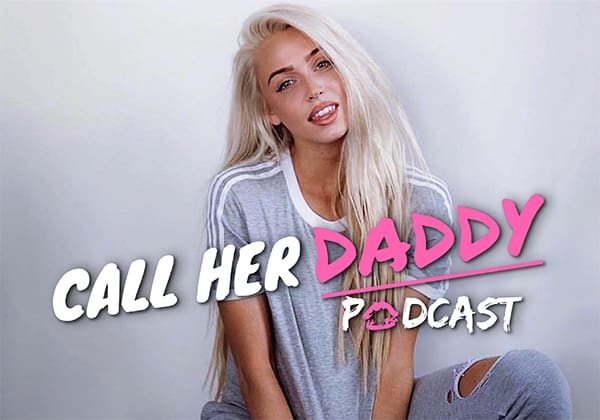Since accountability culture came to the forefront of the cultural zeitgeist, celebrities, corporations and other powerful figures have taken lackluster, commodified stances on social issues, capitalising on the support of people who directly experience them. Feminism has been widely targeted by this marketing, with production companies seeking profit from watered-down, uncontroversial takes on feminist ideas to appeal to a growing market of young women. One of the most successful and profitable examples of this marketable feminism is the podcast Call Her Daddy which, at the time of writing, is in the top 10 on the Spotify podcast charts. Originally hosted by Alex Cooper and Sofia Franklyn, and now just by Cooper after a $60 million deal with Spotify, the show markets itself as having a sex-positive, “modern twist on feminism” through its frank, loud discussions of female sexuality and relationships. As the sex positivity movement has demonstrated, there’s a clear desire amongst many women to have a more open, empowering dialogue about sex in pop culture, and these kinds of candid conversations between women should be a breath of fresh air. The reality is, unfortunately, much more flawed.
As the title suggests, Call Her Daddy’s “modern” version of feminism seeks empowerment through traditionally masculine behaviours, including sexual boldness and objectification of sexual partners. In one of the most misguided displays of girlbossery and internalised misogyny I’ve ever seen, Cooper and her guests emulate blokey locker room talk in their sex and relationship advice to explain how their audience can change themselves to suit the desires of straight men. Feminist hero Alex Cooper delivers what generations of women have fought for: women telling each other that they’re “just a hole”, rating their physical attractiveness on a numerical scale, and telling each other what they can and cannot do sexually based on this rating. Now that’s what feminism’s all about; misogyny isn’t just for the boys anymore!
The problem with Call Her Daddy goes right to the source. The podcast was originally created and run by Barstool Sports, a notoriously misogynistic digital media company whose president David Portnoy was quoted saying that, “just to make friends with the feminists, I’d like to reiterate that we don’t condone rape of any kind at our Blackout Parties in mid-January. However, if a chick passes out, that’s a grey area,” amongst many other comments. With this in mind, it seems that Call Her Daddy was created to join the ranks of many other pieces of media which use pseudo-feminist ideas and buzzwords to fool their audiences into thinking they’re disrupting the status quo (and, conveniently, making extraordinary amounts of money in the process). But what, exactly, is so revolutionary about women encouraging male chauvinism? Not only does Call Her Daddy validate misogyny by telling women to emulate it, but it also directly encourages this behaviour from men. In one episode, responding to a male listener asking if a woman who hasn’t slept with him after seven dates is “just using [him] for a meal ticket” (charming), Cooper says, “stop taking that bitch to fucking dinner” (CHARMING!). For all her talk defaming ‘pick me girls’, Alex Cooper sure seems to enjoy vying for male audience approval.
One of the most common rebuttals to criticism of Call Her Daddy is that the show is “just comedy”, and shouldn’t be taken so seriously. This defence brings up a few questions: namely, isn’t comedy supposed to be funny? But, more importantly, is Call Her Daddy immediately above criticism because of this branding? Just because the show markets itself as comedy, doesn’t mean that the hosts and guests don’t believe in the advice they’re espousing, or that its listeners won’t internalise its misogynistic messaging. TikTok and Twitter are full of posts from teenagers and young women quoting “Father Cooper’s” word as gospel, and even Cooper admits that her listeners are impacted by her advice: “In one episode, I was jokingly like, ‘If he does this, break up with him…then I got hundreds of girls DMing me being like, ‘O.K., I did it,’ and I’m like, ‘Wait, hold on, let’s make sure that’s the right choice for you specifically.”
Listeners also claim that Call Her Daddy’s internalised misogyny is a thing of the past, left behind when Sofia Franklyn left the show and Cooper moved it to Spotify. It’s true that since the Spotify deal, the show has tried to clean up their act somewhat, going softer on the locker room talk and trying to include a wider range of content, such as interviews with celebrities and sexual assault survivors. But in a regular episode, the undercurrent of misogyny prevails; notably, an interview with Tana Mongeau, infamous facetuner and member of Team Bryce, is full of fatphobia and shaming, with Cooper and Mongeau laughing at length about Tana calling herself a “beached fucking whale” and facetuning her body and face into oblivion.
Some may argue that, in the case of feminism, any publicity is good publicity; if feminism is gaining a more widespread following through its embrace by the mainstream media, isn’t this a good thing? When it comes to Call Her Daddy, I wouldn’t call what they’re selling feminism at all. The insidiously misogynistic advice and stories Cooper and her guests tell on the show only serve to encourage women to “rise” to the level of male behaviour in relationships, reflecting the less challenging and controversial principles of liberal feminism which tend to make it to the mainstream. If podcasters who brand their ideas and advice as feminist want to encourage real changes to womens’ sexual empowerment, they need to divorce their ideas from the deeply ingrained concept that power and masculinity are inextricable.







